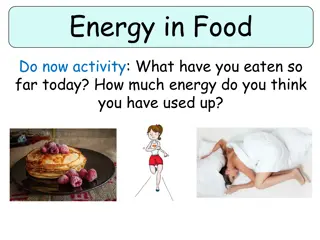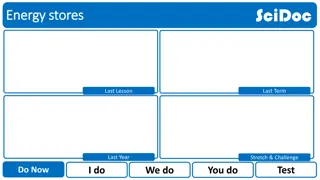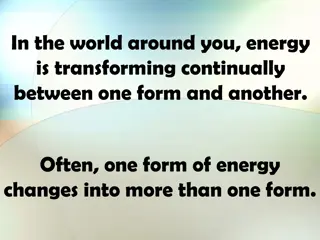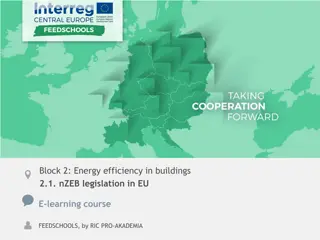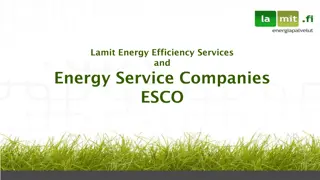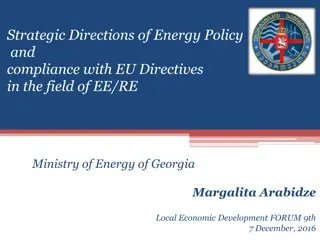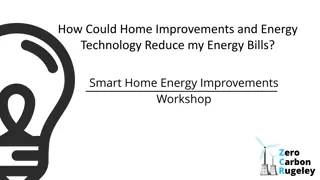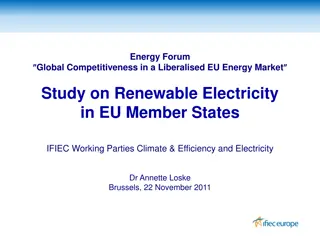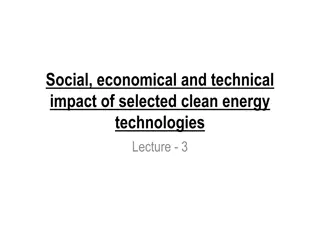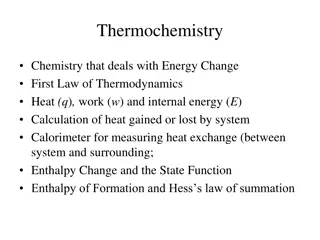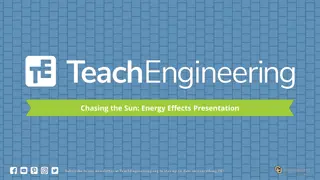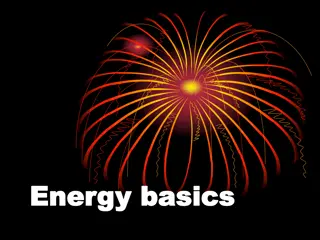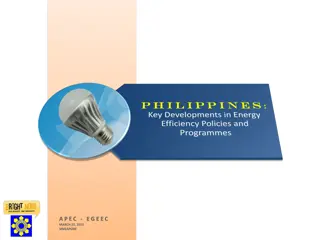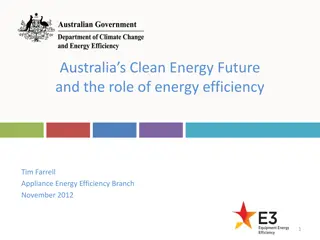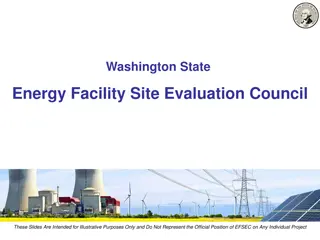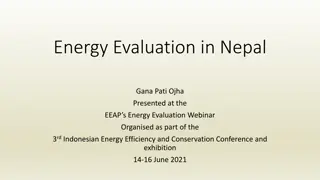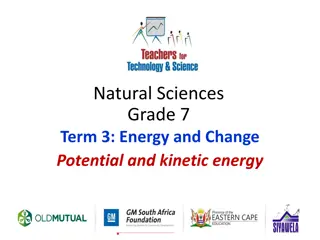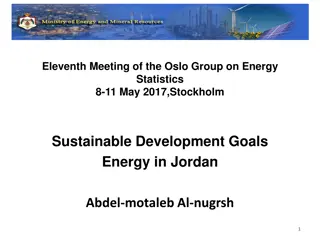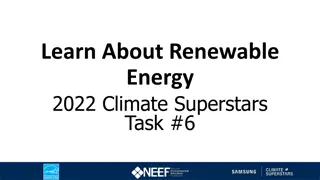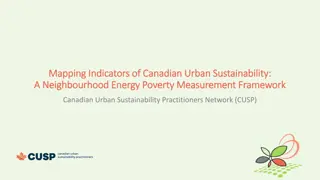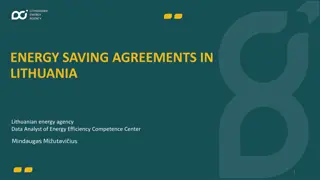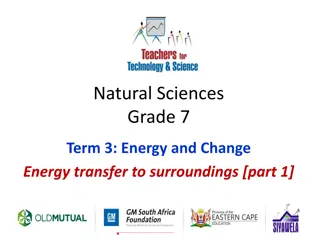Green Energy Market
Green energy also referred to as clean energy, is usually derived from natural sources that are constantly replenished. Solar energy, wind energy, hydroelectric power, biomass energy, geothermal energy, tidal energy, and wave energy are different types of renewable energy. Solar energy is the radian
6 views • 6 slides
Comprehensive Overview of Energy Balances in Germany
This material covers various aspects of energy balances in Germany, including components of energy flowcharts, renewable energy sources in the German energy balance, and total final consumption of road transport energy. It provides a detailed analysis of energy imports, domestic extraction, losses,
2 views • 10 slides
Understanding Energy: Types, Potential, and Kinetic
Dive into the world of energy with a comprehensive guide covering the definition, types, and characteristics of gravitational, potential, and kinetic energy. Explore how energy is the driving force behind all work and movement, with examples and explanations provided for each energy type. Gain insig
2 views • 24 slides
Sustainable Energy Initiatives at Local Level in Lithuania
The National Parliamentary Workshop on Energy Efficiency highlighted the importance of renewable energy development and sustainability at the local level in Lithuania. Initiatives such as the Breakthrough package and Renewable Energy Communities aim to improve energy efficiency, reduce energy povert
2 views • 12 slides
Universal Evaluation Framework: Simplifying Evaluation Processes
This session introduces the Universal Evaluation Framework (UEF) developed for evaluating QAA Scotland Enhancement Themes. Participants learn key evaluation questions, evidence capture, and the Theory of Change to enhance evaluation confidence. The QAA Scotland Evaluation Odyssey details historical
2 views • 14 slides
Explore Energy in Food and Daily Activities
Discover the relationship between energy in food and daily activities. Compare energy values of different foods, estimate daily energy intake, and analyze energy needs based on physical activities. Explore suitable foods for high energy requirements, and understand how to balance energy expenditure.
0 views • 14 slides
Exploring Energy Stores and Transfers in Science Lessons
Dive into the fascinating world of energy stores and transfers through engaging science lessons. Recall different energy stores, common energy transfers, and create flow diagrams to illustrate energy transfers in various scenarios. Explore gravitational, elastic, magnetic, electrostatic potential en
5 views • 9 slides
Energy Assistance Workshop Series Statewide Assessment
The Energy Assistance Workshop Series conducted a statewide assessment to understand energy burden and discuss utility energy assistance programs. The goal was to evaluate the effectiveness of mechanisms for energy assistance to prioritize households with higher energy burdens. The workshops aimed t
0 views • 26 slides
Empowering Women in Energy: SHE in Energy Africa Initiatives
SHE in Energy Africa is a non-profit organization dedicated to narrowing gender disparities, addressing skills shortages, and maximizing socio-economic benefits in the energy sector through skills development and training for girls and women. They aim to empower women with relevant knowledge and ski
4 views • 7 slides
Understanding Energy Transformation in the Natural World
Energy transformation occurs continuously in various forms around us, following the Law of Conservation of Energy. From thermal to chemical and electromagnetic energy, different types of energy are converted and utilized in everyday processes. Examples include the conversion of thermal energy to ele
0 views • 27 slides
Understanding Energy - Forms, Calculations, and Applications
Explore the concept of energy through various images, including forms of energy, kinetic versus potential energy, and calculations involving kinetic and potential energy. Learn about identifying energy states, calculating kinetic energy, and solving physics problems related to energy transfer. Dive
0 views • 27 slides
Understanding Evaluation in Education
Evaluation in education is a comprehensive term that encompasses measurement, testing, and qualitative examination of student behavior. It involves both quantitative and qualitative descriptions, along with value judgments. Differentiating from mere measurement, evaluation provides a deeper analysis
0 views • 28 slides
Understanding Energy Transfers with Sankey Diagrams
Sankey diagrams are visual tools that depict energy transfers within a system, offering insights into efficiency and energy distribution. By examining the width of arrows representing energy flow, one can analyze useful and wasted energy outputs. Inefficient systems show a disproportionate amount of
1 views • 9 slides
Overview of Monitoring and Evaluation in the GEF
The Evaluation in the GEF and Training Module focuses on promoting accountability and learning within the Global Environment Facility (GEF) through monitoring and evaluation activities. The GEF Independent Evaluation Office plays a crucial role in assessing results, effectiveness, and performance of
0 views • 25 slides
Conducting an Effective School Energy Audit
Performing an energy audit at a school helps in understanding energy usage patterns, identifying areas of waste, and creating energy-saving action plans. The audit involves collecting data, creating switch-off lists, and filling out templates methodically to track energy consumption. It should be do
0 views • 16 slides
Understanding EU Legislation and Energy Efficiency in Buildings
This module explores the EU legislation and energy efficiency in buildings with a focus on Nearly Zero Energy Building (nZEB) concepts. It covers the importance of increasing energy efficiency in buildings in the EU, showcasing statistics on energy consumption and CO2 emissions. By improving energy
1 views • 23 slides
Understanding Different Forms of Energy and Work in Physics
Energy in physics is the capacity to do work, and there are various forms of energy such as radiant energy, kinetic energy, gravitational potential energy, elastic potential energy, chemical potential energy, nuclear potential energy, electrical potential energy, thermal energy, and sound energy. Ea
0 views • 47 slides
Understanding the Green Deal Scheme for Energy Efficiency in the UK
The Green Deal is a national retrofit energy efficiency scheme introduced in the UK under the Energy Act 2011. It aims to provide energy efficiency measures to homes and businesses through loans collected via energy savings. Accredited advisers, installers, and providers play key roles in assessing
0 views • 17 slides
South Jersey Gas Home Performance Program Evaluation Overview
Overview of South Jersey Gas's Home Performance Program presented at the AESP National Conference #AESP18. The program includes energy efficiency initiatives, evaluation findings, regulatory approach, goals, marketing strategies, and evaluation methods. Focus on increasing energy efficiency opportun
0 views • 16 slides
Understanding Energy Service Companies (ESCOs) and Their Role in Energy Efficiency
Energy Service Companies (ESCOs) like Lamit offer a range of energy services, from implementing energy-efficiency projects to renewable energy solutions. These companies work as long-term energy management partners, focusing on understanding customer needs, providing energy-saving solutions, and gua
2 views • 18 slides
Overview of Energy Policy and Compliance with EU Directives in Georgia
Ministry of Energy in Georgia focuses on strategic directions for energy policy in alignment with EU directives. The Energy Strategy, Covenant of Mayors, and National Energy Efficiency Action Plan are key initiatives promoting energy efficiency and renewable energy. Projects include consultancy on s
0 views • 10 slides
Exploring Home Energy Improvements and Smart Technology for Energy Efficiency
Discover how home improvements and energy technology can significantly reduce energy bills. Join the Smart Home Energy Improvements Workshop in Zero Carbon Rugeley to explore approaches for sustainable energy production and usage at home. Learn about retrofitting, smart energy systems, and meet char
0 views • 20 slides
Analysis of Renewable Energy Policies in the Liberalised EU Energy Market
This study examines the global competitiveness of the energy forum in a liberalised EU energy market, focusing on renewable electricity in EU member states. It delves into the energy balance, political context regarding European climate targets, industry involvement, and the financial context of ren
0 views • 16 slides
Social, Economical, and Technical Impact of Clean Energy Technologies
This course covers the management of micro-level clean energy projects, emphasizing the social, economic, and technical impacts of selected clean energy technologies. It discusses project organization, tools, project life cycle, financial analysis, barriers, capacity building, and more. It delves in
0 views • 32 slides
Evaluation of FME Zero Emission Neighbourhoods in Smart Cities
The mid-term evaluation process of FME Zero Emission Neighbourhoods in Smart Cities involves self-evaluation, partner evaluation, and panel evaluation. The procedure includes scientific review, evaluation by scholars, and innovation assessment. Key documents like self-reports, progress reports, and
1 views • 20 slides
Basics of Thermochemistry and Energy Changes in Chemistry
Thermochemistry in chemistry involves energy change, the First Law of Thermodynamics, and concepts like heat, work, and internal energy. It explores calculations of heat exchange using calorimeters, Enthalpy Change, Enthalpy of Formation, and more. Energy basics cover the importance of energy change
0 views • 53 slides
Understanding Solar Energy and its Impact
Explore the world of solar energy and its effects on Earth and daily life. Discover the various types of energy and their significance, including electricity, light, heat, and solar energy. Uncover how solar energy influences us and the planet, providing a combination of heat and light energy from t
0 views • 12 slides
Understanding Energy Basics: Temperature, Heat, and Transfer
Explore the fundamental concepts of energy, including temperature, heat, and energy transfer. Learn how temperature differs from heat, how they are measured, and the relationship between thermal energy and water volume. Discover the role of chemical energy and sound energy, and how energy is transfo
0 views • 12 slides
Enhancing Energy Efficiency in Saudi Arabia: SEEC's Impactful Initiatives
The Saudi Energy Efficiency Center (SEEC) plays a crucial role in improving energy efficiency in Saudi Arabia through strategic programs and initiatives. Established in 2010, SEEC focuses on sectors like transportation, industry, and buildings, with a goal to reduce energy consumption and promote aw
0 views • 29 slides
Energy Efficiency Policies and Programs in the Philippines
The Philippines has implemented various energy efficiency policies and programs to manage and reduce energy consumption across different sectors. These initiatives include the Government Energy Management Program, Energy Consumption Monitoring, ESCO Accreditation System, and the Energy Efficiency an
0 views • 12 slides
Australia's Clean Energy Future: Role of Energy Efficiency Programs
The discussion revolves around Australia's clean energy future and the pivotal role of energy efficiency in driving sustainable practices. It covers topics such as the Carbon Pricing Mechanism, Encouraging Energy Efficiency initiatives, and the Equipment Energy Efficiency Program (E3). The success s
0 views • 13 slides
Overview of Washington State Energy Facility Site Evaluation Council (EFSEC)
The Washington State Energy Facility Site Evaluation Council (EFSEC) was formed in 1970 to oversee the permitting process for energy facilities in the state. It serves as a one-stop permitting agency for various permits required for energy projects, making recommendations to the Governor for final d
0 views • 13 slides
Understanding Elastic Potential Energy and Energy Conservation Principles
Elastic potential energy is stored in elastic bodies like springs and is vital in understanding energy conservation principles. This energy can be calculated using the work done by an ideal spring on a block. By applying elastic potential energy concepts, one can analyze scenarios where a spring sys
0 views • 9 slides
Energy Evaluation in Nepal: Government's Role and Policy Framework
Nepal emphasizes clean energy for sustainable development, with a focus on hydropower generation and climate change mitigation. Evaluation of energy policies and procedures is crucial, with a strong emphasis on monitoring and limited work on evaluation. The country is preparing to raise its voice on
0 views • 5 slides
Understanding Energy: Potential and Kinetic Forms in Grade 7 Natural Sciences
Energy in various forms is explored in Grade 7 Natural Sciences, with a focus on potential and kinetic energy. Energy is the ability to do work and exists in different types like heat, chemical, electromagnetic, nuclear, and mechanical. The sun serves as a primary energy source. Potential energy is
0 views • 11 slides
Energy Strategy and Challenges in Jordan: Towards Sustainable Development
The Eleventh Meeting of the Oslo Group on Energy Statistics discussed the energy sector in Jordan, highlighting challenges such as population growth, energy demand, and high energy costs. Jordan aims to diversify energy resources, reduce oil dependency, and enhance environmental protection through i
0 views • 34 slides
Understanding Renewable Energy and its Benefits in 2022
Renewable energy sources like wind, waves, tides, sunlight, geothermal heat, and biomass play a crucial role in combating climate change by reducing greenhouse gas emissions. This task educates about the differences between renewable and non-renewable energy sources, the benefits of renewables, and
0 views • 10 slides
Mapping Indicators of Canadian Urban Sustainability: A Framework for Neighborhood Energy Poverty Measurement
The Canadian Urban Sustainability Practitioners Network (CUSP) is implementing a project to reduce energy poverty through local clean energy access programs. The project aims to achieve energy and emissions goals, transition to clean energy, and benefit low/moderate-income households. By utilizing a
0 views • 24 slides
Energy Saving Agreements in Lithuania: Legal Framework and Targets
Lithuania's energy saving agreements are guided by a comprehensive legal framework including laws on energy efficiency and methodologies for energy audits. The country has set ambitious energy efficiency targets for 2030, focusing on sectors like building renovation, industry, and household applianc
0 views • 14 slides
Energy Transfer and Efficiency in Grade 7 Natural Sciences
Explore energy transfer to surroundings, useful and wasted energy examples, and the concept of efficiency in energy systems. Identify examples of useful energy and reasons, as well as wasted energy sources. Understand the input and output energy of various appliances to grasp the importance of effic
0 views • 6 slides





